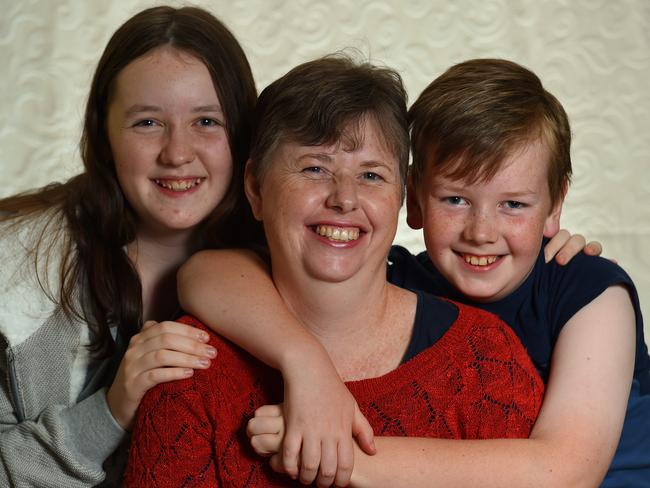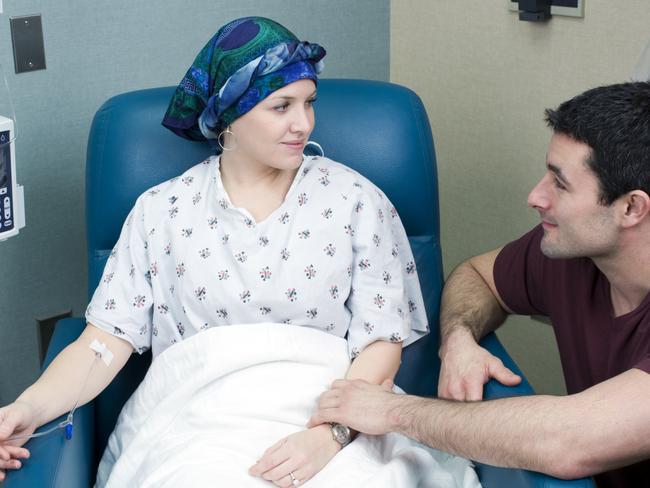$5000 a month drugs that delay the progression of breast cancer recommended for subsidy
THEY can delay the progression of metastatic breast cancer by two years, but the $5000 per month treatments have been beyond the reach of many women — until now.

Illness
Don't miss out on the headlines from Illness. Followed categories will be added to My News.
EXCLUSIVE
Thousands of women diagnosed with metastatic breast cancer will get access to a subsidy for two lifesaving pills that can delay cancer progression by two years.
The treatments Ibrance and Kisqali that cost $5000 a month and work in metastatic breast cancer are in line for a government subsidy that will slash the cost to just $39.50 per month.
The government’s expert advisory body has recommend the drugs be subsidised but a price has to be settled with pharmaceutical companies and federal cabinet still has to rubber stamp the high-cost treatment.
The lifesaving medicines have been available to women in the US since 2015 but here Ibrance was knocked back for subsidy twice.
Australian women had to raid their superannuation or travel to Malaysia and Hong Kong where the medicine is cheaper.
More recently over 600 Australian women have benefited from compassionate access schemes run by pharmaceutical companies Novartis (which makes Kisqali) and Pfizer (which makes Ibrance and has a smaller compassionate program).

Breast Cancer Network Australia which represents over 130,000 women with breast cancer has campaigned vigorously for the subsidy getting 32,000 signatures on a petition and providing a submission to the Pharmaceutical Benefits Advisory Committee.
“People with cancer want to live longer but they also want to live well,” says BCNA director of policy and advocacy Danielle Spence.
“Slowing the progression of the disease means they can spend time with their family, work and live as normal a life as possible,” she said.
Oncologist Fran Boyle says the treatments called CDK inhibitors are for the 2000 women with metastatic hormone receptor negative cancer.
They work in conjunction with existing hormone blocking drugs called aromatase inhibitors.
“What they do is they get into the machinery of cell division and stop cancer cells developing resistance to the hormone blocking treatment,” she said.
“On average they control the disease for twice as long, the average time to disease progression is two years compared to one year on hormone blockers alone,” she said.
BCNA is calling on the pharmaceutical companies to reach agreement on price as quickly as possible.
“We are asking Greg Hunt to set a cabinet date as fast as possible and we are asking our members to write to their MPs,” Ms Spence said.

Melbourne mother Katherine Henry managed to get Ibrance as part of a clinical trial.
Diagnosed with stage three invasive ductal cell carcinoma in 2016, the 43 year old had a double mastectomy.
Although she is technically in remission because she had a stage three cancer there is a high chance of it recurring and the trial will determine whether Ibrance has any effect on preventing or delaying that recurrence.
“I want to have grandkids, I want to see my kids grow up, it’s scary when you are told that possibility could be taken away,” she said.
The side effects of surgery, chemotherapy, radiation on ongoing treatment have suppressed her immune system, she is fatigued but she is still able to work three days a week as a nurse in palliative care.
“I get it for free, it’s very cost prohibitive, about $6,000 a month and people are using their superannuation to pay for the drug because it has such a big impact on their life,” she said.
“I’m very lucky I’m on a trial and me being on the trial is giving evidence and will increase the chance of it being funded in the future,” she said.

Melbourne mum Susan Crow was lucky enough to qualify for the compassionate access program for the CDK inhibitor Kisqali and is on her eighth cycle of the drug.
Diagnosed with breast cancer in 2011 she had a lumpectomy and lymph glands removed but the cancer returned in her breast and her liver last year.
Her new cancer was inoperable but her oncologist put her on Kisqali, she had to work hard to overcome the nausea caused by the tablets but the results are encouraging.
“All the results are good, the tumour in my liver has faded to not being there, and in the breast it has shrunk, I can’t feel it anymore,” she said.
”I feel good, I can cope with work full time.”
Susan says she’s looking forward to a three month cruise around Europe later this year and her daughter’s wedding in Calgary, Canada.

Another breakthrough breast cancer treatment is in the pipeline, PTX200 is being funded by Australian company Prescient Therapeutics and it neutralises a protein called AKT that causes cancer and that makes cancers resistant to chemotherapy work better.
An early stage trial to check the safety and optimum dosage in the US found five women with locally advanced had their tumours shrink with two experiencing a complete response to the drug when used in combination with chemotherapy Taxol.
On Taxol alone only 25 per cent of women with locally advanced breast cancer have a complete response says drug developer Professor Said Sebti.
The drug is also being tested for use in ovarian cancer and leukaemia.
A second treatment called PTX 100 which neutralises GGT-1 a protein that activates cancer causing proteins is being looked at as a possible treatment for solid and blood cancers carrying certain mutations and will commence clinical trial later this year.
Originally published as $5000 a month drugs that delay the progression of breast cancer recommended for subsidy
